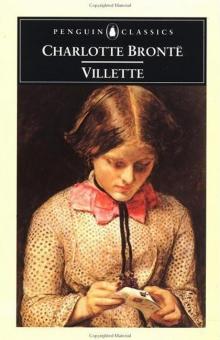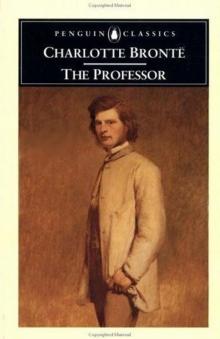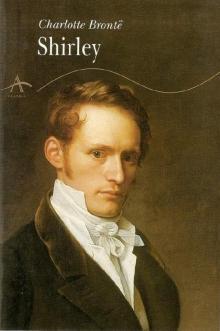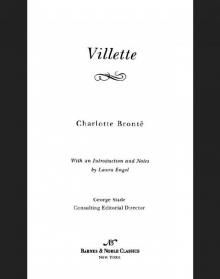- Home
- Charlotte Bronte
Villette (Barnes & Noble Classics Series) Page 8
Villette (Barnes & Noble Classics Series) Read online
Page 8
“Maria,” he said, “I am dying in Paradise.” He spent his last breath in faithful words for me. When the dawn of Christmas morning broke, my Frank was with God.
‘And that,’ she went on, ‘happened thirty years ago. I have suffered since. I doubt if I have made the best use of all my calamities. Soft, amiable natures they would have refined to saintliness; of strong, evil spirits they would have made demons; as for me, I have only been a woe-struck and selfish woman.
‘You have done much good,’ I said; for she was noted for her liberal almsgiving.
‘I have not withheld money, you mean, where it could assuage affliction. What of that? It cost me no effort or pang to give. But I think from this day I am about to enter a better frame of mind, to prepare myself for reunion with Frank. You see I still think of Frank more than of God; and unless it be counted that in thus loving the creature so much, so long, and so exclusively, I have not at least blasphemed the Creator, small is my chance of salvation. What do you think, Lucy, of these things? Be my chaplain and tell me.’
This question I could not answer: I had no words. It seemed as if she thought I had answered it.
‘Very right, my child. We should acknowledge God merciful, but not always for us comprehensible. We should accept our own lot whatever it be, and try to render happy that of others. Should we not? Well, to-morrow I will begin by trying to make you happy. I will endeavour to do something for you, Lucy: something that will benefit you when I am dead. My head aches now with talking too much; still I am happy. Go to bed. The clock strikes two. How late you sit up; or rather how late I, in my selfishness, keep you up. But go now; have no more anxiety for me: I feel I shall rest well.’
She composed herself as if to slumber. I, too, retired to my crib in a closet within her room. The night passed in quietness; quietly her doom must at last have come: peacefully and painlessly: in the morning she was found without life, nearly cold but all calm and undisturbed. Her previous excitement of spirits and change of mood had been the prelude of a fit; one stroke sufficed to sever the thread of an existence so long fretted by affliction.
CHAPTER 5
Turning a New Leaf
My mistress being dead, and I once more alone, I had to look out for a new place. About this time I might be a little—a very little, shaken in nerves. I grant I was not looking well, but on the contrary, thin, haggard, and hollow-eyed; like a sitter-up at night, like an over-wrought servant, or a placeless person in debt. In debt, however, I was not; nor quite poor; for though Miss Marchmont had not had time to benefit me, as, on that last night, she said she intended, yet after the funeral, my wages were duly paid by her second cousin, the heir, an avaricious-looking man, with pinched nose and narrow temples, who, indeed, I heard long afterwards, turned out a thorough miser: a direct contrast to his generous kinswoman, and a foil to her memory, blessed to this day by the poor and needy. The possessor, then, of fifteen pounds; of health though worn not broken, and of a spirit in similar condition; I might still, in comparison with many people, be regarded as occupying an enviable position. An embarrassing one it was, however, at the same time; as I felt with some acuteness on a certain day, of which the corresponding one in the next week was to see my departure from my present abode, while with another I was not provided.
In this dilemma I went, as a last and sole resource, to see and consult an old servant of our family; once my nurse, now housekeeper at a grand mansion not far from Miss Marchmont’s. I spent some hours with her; she comforted, but knew not how to advise me. Still all inward darkness, I left her about twilight; a walk of two miles lay before me; it was a clear, frosty night. In spite of my solitude, my poverty, and my perplexity, my heart, nourished and nerved with the vigour of a youth that had yet counted twenty-three summers, beat light and not feebly. Not feebly, I am sure, or I should have trembled in that lonely walk, which lay through still fields, and passed neither village nor farm-house, nor cottage; I should have quailed in the absence of moonlight, for it was by the leading of stars only I traced the dim path; I should have quailed still more in the unwonted presence of that which to-night shone in the north, a moving mystery—the Aurora Borealis. But this solemn stranger influenced me otherwise than through my fears. Some new power it seemed to bring. I drew in energy with the keen, low breeze that blew on its path. A bold thought was sent to my mind; my mind was made strong to receive it.
‘Leave this wilderness,’ it was said to me, ‘and go out hence.’
‘Where?’ was the query.
I had not very far to look: gazing from this country parish in the flat, rich middle of England—I mentally saw within reach what I had never yet beheld with my bodily eyes; I saw London.
The next day I returned to the hall, and asking once more to see the housekeeper, I communicated to her my plan.
Mrs. Barrett was a grave, judicious woman, though she knew little more of the world than myself; but grave and judicious as she was, she did not charge me with being out of my senses: and, indeed, I had a staid manner of my own which ere now had been as good to me as cloak and hood of hodden gray;f since under its favour I had been enabled to achieve with impunity, and even approbation, deeds that if attempted with an excited and unsettled air, would in some minds have stamped me as a dreamer and zealot.
The housekeeper was slowly propounding some difficulties, while she prepared orange-rind for marmalade, when a child ran past the window and came bounding into the room. It was a pretty child, and as it danced, laughing, up to me—for we were not strangers (nor, indeed, was its mother—a young married daughter of the house—a stranger)—I took it on my knee. Different as were our social positions now, this child’s mother and I had been schoolfellows, when I was a girl of ten and she a young lady of sixteen; and I remembered her—good-looking, but dull-in a lower class than mine.
I was admiring the boy’s handsome dark eyes, when the mother, young Mrs. Leigh, entered. What a beautiful and kind-looking woman was the good-natured and comely, but unintellectual girl become! Wifehood and maternity had changed her thus, and I have since seen them change others even less promising than she. Me she had forgotten. I was changed too; though not, I fear, for the better. I made no attempt to recall myself to her memory: why should I? She came for her son to accompany her in a walk, and behind her followed a nurse carrying an infant. I only mention the incident because, in addressing the nurse, Mrs. Leigh spoke French (very bad French, by the way, and with an incorrigibly bad accent, again forcibly reminding me of our school-days); and I found the woman was a foreigner. The little boy chattered volubly in French too. When the whole party were withdrawn, Mrs. Barrett remarked that her young lady had brought that foreign nurse home with her two years ago, on her return from a Continental excursion; that she was treated almost as well as a governess, and had nothing to do but walk out with the baby and chatter French with Master Charles; ‘and,’ added Mrs. Barrett, ‘she says there are many Englishwomen in foreign families as well placed as she.’
I stored up this piece of casual information, as careful housewives store seemingly worthless shreds and fragments for which their prescient minds anticipate a possible use some day. Before I left my old friend, she gave me the address of a respectable old-fashioned inn in the city, which, she said, my uncles used to frequent in former days.
In going to London, I ran less risk and evinced less enterprise than the reader may think. In fact, the distance was only fifty miles. My means would suffice both to take me there, to keep me a few days, and also to bring me back if I found no inducement to stay. I regarded it as a brief holiday, permitted for once to work-weary faculties, rather than as an adventure of life and death. There is nothing like taking all you do at a moderate estimate: it keeps mind and body tranquil; whereas grandiloquent notions are apt to hurry both into fever.
Fifty miles were then a day’s journey, (for I speak of a time gone by: my hair which till a late period withstood the frosts of time, lies now, at last white, under a white cap,
like snow beneath snow). About nine o’clock of a wet February night I reached London.
My reader, I know, is one who would not thank me for an elaborate reproduction of poetic first impressions; and it is well, inasmuch as I had neither time nor mood to cherish such; arriving as I did late, on a dark, raw, and rainy evening, in a Babylong and a wilderness of which the vastness and the strangeness tried to the utmost any powers of clear thought and steady self-possession with which, in the absence of more brilliant faculties, Nature might have gifted me.
When I left the coach, the strange speech of the cabmen and others waiting round, seemed to me odd as a foreign tongue. I had never before heard the English language chopped up in that way. However, I managed to understand and to be understood, so far as to get myself and trunk safely conveyed to the old inn whereof I had the address. How difficult, how oppressive, how puzzling seemed my flight! In London for the first time; at an inn for the first time; tired with travelling; confused with darkness; palsied with cold; unfurnished with either experience or advice to tell me how to act, and yet—to act obliged.
Into the hands of Common-sense I confided the matter. Common-sense, however, was as chilled and bewildered as all my other faculties, and it was only under the spur of an inexorable necessity that she spasmodically executed her trust. Thus urged, she paid the porter: considering the crisis, I did not blame her too much that she was hugely cheated; she asked the waiter for a room; she timorously called for the chambermaid; what is far more, she bore, without being wholly overcome, a highly supercilious style of demeanour from that young lady, when she appeared.
I recollect this same chambermaid was a pattern of town prettiness and smartness. So trim her waist, her cap, her dress—I wondered how they had all been manufactured. Her speech had an accent which in its mincing glibness seemed to rebuke mine as by authority; her spruce attire flaunted an easy scorn at my plain country garb.
‘Well, it can’t be helped,’ I thought, ‘and then the scene is new, and the circumstances; I shall gain good.’
Maintaining a very quiet manner towards this arrogant little maid, and subsequently observing the same towards the parsonic-looking, black-coated, white-neckclothed waiter, I got civility from them ere long. I believe at first they thought I was a servant; but in a little while they changed their minds, and hovered in a doubtful state between patronage and politeness.
I kept up well till I had partaken of some refreshment, warmed myself by a fire, and was fairly shut into my room; but, as I sat down by the bed and rested my head and arms on the pillow, a terrible oppression overcame me. All at once my position rose on me like a ghost. Anomalous; desolate, almost blank of hope, it stood. What was I doing here alone in great London? What should I do on the morrow? What prospects had I in life? What friends had I on earth? Whence did I come? Whither should I go? What should I do?
I wet the pillow, my arms, and my hair, with rushing tears. A dark interval of most bitter thought followed this burst; but I did not regret the step taken, nor wish to retract it. A strong, vague persuasion, that it was better to go forward than backward, and that I could go forward—that a way, however narrow and difficult, would in time open, predominated over other feelings: its influence hushed them so far, that at last I became sufficiently tranquil to be able to say my prayers and seek my couch. I had just extinguished my candle and lain down, when a deep, low, mighty tone swung through the night. At first I knew it not; but it was uttered twelve times, and at the twelfth colossal hum and trembling knell, I said: ‘I lie in the shadow of St. Paul’s.’
CHAPTER 6
London
The next day was the first of March, and when I awoke, rose, and opened my curtain, I saw the risen sun struggling through fog. Above my head, above the house-tops, co-elevate almost with the clouds, I saw a solemn, orbed mass, dark-blue and dim-THE DOME.h While I looked, my inner self moved; my spirit shook its always-fettering wings half loose; I had a sudden feeling as if I, who had never yet truly lived, were at last about to taste life: in that morning my soul grew as fast as Jonah’s gourd.i
‘I did well to come,’ I said, proceeding to dress with speed and care. ‘I like the spirit of this great London which I feel around me. Who but a coward would pass his whole life in hamlets, and for ever abandon his faculties to the eating rust of obscurity?’
Being dressed, I went down, not travel-worn and exhausted, but tidy and refreshed. When the waiter came in with my breakfast, I managed to accost him sedately, yet cheerfully; we had ten minutes’ discourse, in the course of which we became usefully known to each other.
He was a gray-haired, elderly man; and, it seemed, had lived in his present place twenty years. Having ascertained this, I was sure he must remember my two uncles, Charles and Wilmot, who, fifteen years ago, were frequent visitors here. I mentioned their names; he recalled them perfectly, and with respect. Having intimated my connection, my position in his eyes was henceforth clear, and on a right footing. He said I was like my uncle Charles: I suppose he spoke truth, because Mrs. Barrett was accustomed to say the same thing. A ready and obliging courtesy now replaced his former uncomfortably doubtful manner: henceforth I need no longer be at a loss for a civil answer to a sensible question.
The street on which my little sitting-room window looked was narrow, perfectly quiet, and not dirty: the few passengers were just such as one sees in provincial towns: here was nothing formidable; I felt sure I might venture out alone.
Having breakfasted, out I went. Elation and pleasure were in my heart: to walk alone in London seemed of itself an adventure. Presently I found myself in Paternoster-row—classic ground this. I entered a bookseller’s shop, kept by one Jones; I bought a little book—a piece of extravagance I could ill afford; but I thought I would one day give or send it to Mrs. Barrett. Mr. Jones, a dried-in man of business, stood behind his desk; he seemed one of the greatest, and I one of the happiest, of beings.
Prodigious was the amount of life I lived that morning. Finding myself before St. Paul’s, I went in; I mounted to the dome: I saw thence London, with its river, and its bridges, and its churches; I saw antique Westminster, and the green Temple Gardens, with sun upon them, and a glad, blue sky of early spring above; and, between them and it, not too dense a cloud of haze.
Descending, I went wandering whither chance might lead, in a still ecstacy of freedom and enjoyment; and I got—I know not how—I got into the heart of city life. I saw and felt London at last: I got into the Strand; I went up Cornhill; I mixed with the life passing along; I dared the perils of crossings. To do this, and to do it utterly alone, gave me, perhaps an irrational, but a real pleasure. Since those days, I have seen the West-end, the parks, the fine squares; but I love the city far better. The city seems so much more in earnest: its business, its rush, its roar, are such serious things, sights, and sounds. The city is getting its living—the West-end but enjoying its pleasure. At the West-end you may be amused, but in the city you are deeply excited.
Faint, at last, and hungry (it was years since I had felt such healthy hunger), I returned, about two o’clock, to my dark, old, and quiet inn. I dined on two dishes—a plain joint, and vegetables; both seemed excellent (how much better than the small, dainty messes Miss Marchmont’s cook used to send up to my kind, dead mistress and me, and to the discussion of which we could not bring half an appetite between us). Delightfully tired, I lay down on three chairs for an hour (the room did not boast a sofa). I slept, then I woke and thought for two hours.
My state of mind, and all accompanying circumstances, were just now such as most to favour the adoption of a new, resolute, and daring—perhaps desperate—line of action. I had nothing to lose. Unutterable loathing of a desolate existence past forbade return. If I failed in what I now designed to undertake, who, save myself, would suffer? If I died far away from—home, I was going to say, but I had no home—from England, then, who would weep?
I might suffer; I was inured to suffering: death itself had not, I tho
ught, those terrors for me which it has for the softly reared. I had, ere this, looked on the thought of death with a quiet eye. Prepared, then, for any consequences, I formed a project.
That same evening I obtained from my friend, the waiter, information respecting the sailing of vessels for a certain continental port, Boue-Marine. No time, I found, was to be lost: that very night I must take my berth. I might, indeed, have waited till the morning before going on board, but would not run the risk of being too late.
‘Better take your berth at once ma’am,’ counselled the waiter. I agreed with him, and having discharged my bill, and acknowledged my friend’s services at a rate which I now know was princely, and which in his eyes must have seemed absurd—and indeed, while pocketing the cash, he smiled a faint smile which intimated his opinion of the donor’s savoir-faire—he proceeded to call a coach. To the driver he also recommended me, giving at the same time an injunction about taking me, I think, to the wharf, and not leaving me to the watermen; which that functionary promised to observe, but failed in keeping his promise. On the contrary, he offered me up as oblation, served me as a dripping roast, making me alight in the midst of a throng of watermen.
This was an uncomfortable crisis. It was a dark night. The coachman instantly drove off as soon as he had got his fare; the watermen commenced a struggle for me and my trunk. Their oaths I hear at this moment: they shook my philosophy more than did the night, or the isolation, or the strangeness of the scene. One laid hands on my trunk. I looked on and waited quietly; but when another laid hands on me, I spoke up, shook off his touch, stepped at once into a boat, desired austerely that the trunk should be placed beside me—‘Just there,’—which was instantly done; for the owner of the boat I had chosen became now an ally: I was rowed off.

 Villette
Villette Stancliffe's Hotel
Stancliffe's Hotel Jane Eyre
Jane Eyre The Professor
The Professor Shirley
Shirley The Complete Novels of Charlotte Brontë
The Complete Novels of Charlotte Brontë Jane Eyre (Barnes & Noble Classics Series)
Jane Eyre (Barnes & Noble Classics Series) Villette (Barnes & Noble Classics Series)
Villette (Barnes & Noble Classics Series)